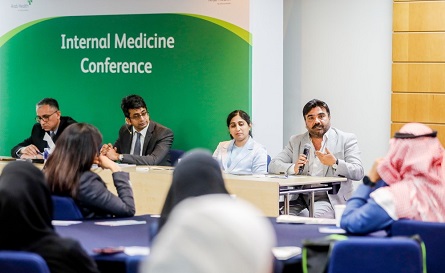|
|
New gut hormone
combinations could replace
weight loss surgery for
obese type 2 diabetic
patients, according to Arab
Health experts
(Dubai, UAE) -
With obesity
affecting approximately 650
million adults worldwide,
constituting a major
contributor to global
diabetes rates, treatments
that result in substantial
weight reductions may
improve outcomes for people
living with diabetes and
negates the need for weight
loss (bariatric) surgery in
the future.
With the
American Diabetes
Association’s (ADA) recently
released 2023 guidelines for
diabetes management
recommending more aggressive
weight loss (up to 15% of
body weight), discussions at
the Internal Medicine
Conference at Arab Health
2023 centered around the use
of new gut peptide agents,
and their profound impact on
both glycemic and weight
management in individuals
with type 2 diabetes.
Panelists from the UAE's
top healthcare facilities,
including Imperial College
Diabetes Centre, Cleveland
Clinic Abu Dhabi, and
American Hospital Dubai,
highlighted the
transformative role of new
gut peptide combinations,
specifically combinations of
Glucagon-like peptide-1
(GLP-1) and
glucose-dependent
insulinotropic polypeptide
(GIP) hormones, in the
future of bariatric surgery.
GLP-1, for example, is a
peptide derived from
differential processing of
the precursor for the
hormone glucagon. It is
secreted predominantly by
endocrine cells in the gut
epithelium in response to
food intake.
Speaking
at the conference, Dr. Saf
Naqvi, Imperial College
Diabetes Centre, Abu Dhabi,
UAE, said: “Typically,
diabetes management has
involved the non-disease
modification medications
such as Metformin, which
wasn't addressing the core
problem, which was weight
management. And it is only
recently, through bariatric
surgery, that we have
understood that there is
something else; it is not
just food restriction or
transposition of the
internal visceral that does
the job.
“Bariatric
surgery leads to an average
of 15% to 25% total weight
loss, and the effects of
weight loss in these
patients are huge. Their
diabetes reverses quickly,
even before the weight loss
happens. We knew that this
happens due to changes in
gut peptides and the effect
of those peptides on satiety
- the feeling of fullness
that persists after eating -
and weight.”
Presently, the peptides used
for weight management
include GLT-1 analogues,
with Liraglutide coming onto
the market first. However,
the newer peptides are
significantly more potent,
resulting in weight loss of
up to 15% of body weight.
“For instance, the
new combination analog
Tirzapetide – a once-weekly
subcutaneous injectable
medication that activates
both the GLP-1 and GIP
receptors – is showing
phenomenal results," Dr.
Naqvi added.
According to Dr. Naqvi, the
challenge now is to develop
peptides that do not cause
side effects such as nausea,
as studies have shown that
bariatric patients, who
experience an increase in a
combination of peptides
after surgery, do not
experience nausea.
He said: “The newer peptides
currently in preparation
that use a combination of
different peptides, such as
GLP and GIP, not only
normalize glucose very
quickly but also give us the
weight loss closer to what
we see in patients that have
bariatric surgery.”
Arab Health 2023 is being
held from 30 January – 2
February 2023 at the Dubai
World Trade Centre, Dubai,
UAE.
For more information,
visit
Arab Health.
 PRINT
THIS ARTICLE
font>/a>
PRINT
THIS ARTICLE
font>/a>
|



